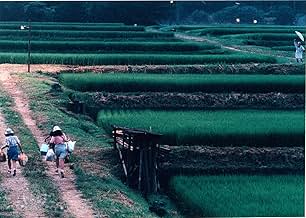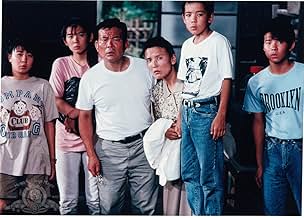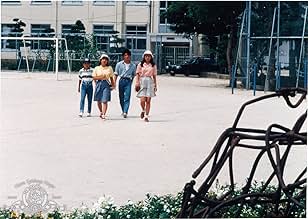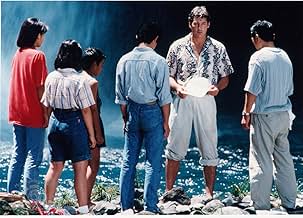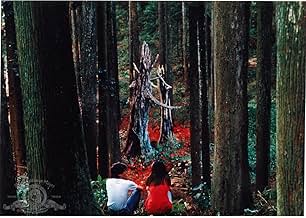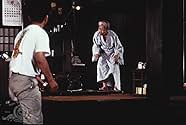AVALIAÇÃO DA IMDb
7,2/10
7,9 mil
SUA AVALIAÇÃO
Numas férias de verão, uma senhora sobrevivente da bomba de Nagasaki está com seus quatro netos reunidos e conta as lembranças do dia do ataque, que vitimou milhares de pessoas (60 mil e 80 ... Ler tudoNumas férias de verão, uma senhora sobrevivente da bomba de Nagasaki está com seus quatro netos reunidos e conta as lembranças do dia do ataque, que vitimou milhares de pessoas (60 mil e 80 mil em Nagasaki), entre eles o marido, pai e avó.Numas férias de verão, uma senhora sobrevivente da bomba de Nagasaki está com seus quatro netos reunidos e conta as lembranças do dia do ataque, que vitimou milhares de pessoas (60 mil e 80 mil em Nagasaki), entre eles o marido, pai e avó.
- Direção
- Roteiristas
- Artistas
- Prêmios
- 5 vitórias e 7 indicações no total
Richard Gere
- Clark
- (as Richâdo Gia)
Mieko Suzuki
- Minako
- (as Mie Suzuki)
- Direção
- Roteiristas
- Elenco e equipe completos
- Produção, bilheteria e muito mais no IMDbPro
Avaliações em destaque
"Rhapsody in August" (1991) is Akira Kurosawa's next to last film. It belongs to Kurosawa's final period of film-making when he moved away from themes such as samurai stories and historic eras of Japan and focused on issues such as the Second World War and its effect on the lives of ordinary people in Japan. The title of this film is a reference to August 9, 1945, when the atomic bomb fell on Nagasaki.
"Rhapsody in August" tells the story of four young girls and boys who visit their grandmother in a village near Nagasaki for their summer vacation. She is one of the survivors of the atomic bomb fell on Nagasaki during the war but she lost her husband in the atomic bomb attack. It is through her that her grandchildren learn about the atomic bomb attack and how it killed their grandfather. The children's parents have gone to Hawaii to visit the grandmother's elder brother, who had married an American woman and lived there since then.
The film shows how the children's indifference and disrespect for their grandmother gradually turns into understanding and respect for the sufferings she has gone through. We are allowed to explore the Nagasaki catastrophe through the grandmother's point of view and its aftermath through the children's view, who come to show much more understanding for the catastrophic event than their parents, who only seem to care about not raising the issue of the atomic bomb on fear that it might upset their American relatives and deprive them from their enterprise.
Although the film, in several occasions, makes direct criticism against the US over the Nagasaki atomic bomb attack, it is mostly through the grandmother's powerful and vivid recollections of the war, and the children's understanding of the events, that the depth of people's sufferings and the cruelty of the act -- the atomic bomb attack -- are seen. One great example is when the grandmother compares the mushroom cloud of the atomic bomb to a great eye watching over the city.
The grandmother is the living soul of all the pains caused by the atomic bomb and Kurosawa, all through the film and particularly in its iconic ending, well reminds us that time might not heal all wounds.
"Rhapsody in August" tells the story of four young girls and boys who visit their grandmother in a village near Nagasaki for their summer vacation. She is one of the survivors of the atomic bomb fell on Nagasaki during the war but she lost her husband in the atomic bomb attack. It is through her that her grandchildren learn about the atomic bomb attack and how it killed their grandfather. The children's parents have gone to Hawaii to visit the grandmother's elder brother, who had married an American woman and lived there since then.
The film shows how the children's indifference and disrespect for their grandmother gradually turns into understanding and respect for the sufferings she has gone through. We are allowed to explore the Nagasaki catastrophe through the grandmother's point of view and its aftermath through the children's view, who come to show much more understanding for the catastrophic event than their parents, who only seem to care about not raising the issue of the atomic bomb on fear that it might upset their American relatives and deprive them from their enterprise.
Although the film, in several occasions, makes direct criticism against the US over the Nagasaki atomic bomb attack, it is mostly through the grandmother's powerful and vivid recollections of the war, and the children's understanding of the events, that the depth of people's sufferings and the cruelty of the act -- the atomic bomb attack -- are seen. One great example is when the grandmother compares the mushroom cloud of the atomic bomb to a great eye watching over the city.
The grandmother is the living soul of all the pains caused by the atomic bomb and Kurosawa, all through the film and particularly in its iconic ending, well reminds us that time might not heal all wounds.
A beautiful, beautiful film. If you only know Kurosawa through Seven Samurai then this will come as something of a shock. Gentle, sensitive, moving and uplifting. The cinematography is sumptuous with plenty of touches that let you know that this is no ordinary film maker. By far the best of his later films in my opinion.
Don't be confused by the 'starring Richard Gere' tag. He only has a minor part, though he takes it well.
Just go and see it!
Don't be confused by the 'starring Richard Gere' tag. He only has a minor part, though he takes it well.
Just go and see it!
When I saw this movie, I remembered Louis-Ferdinand Celine's book, "Journey to the End of the Night", a anti-war book. Reading reviews about the movie, listening to what people in the US had to say, seeing the reaction of the American media to this movie, I was sad, simply sad. This movie is not about Japan, it's not about America, it could have been anywhere a war had happened.
This movie is a poem against war and the scars it leaves forever deep in the mind of the people who suffered those wars. Those who didn't suffer a war are lucky, and shouldn't be blamed for being this lucky, but they should see movies like this to understand what war is about. The world is never better after war. The first ones to agree to settle things through warfare are the ones who didn't suffer war. There are no winners in a war, just remember.
I'm sorry that all those who felt attacked in their pride as Americans are missing the point of this movie. If your father or your grandfather, or your friend has been to war, just listen to them.
The performance of the grandmother will make you forget you're watching a movie! It is filmed simply and un-pretentiously, though is a very emotional film.
Enjoy.
PS: Oh and I'm not Japanese...
This movie is a poem against war and the scars it leaves forever deep in the mind of the people who suffered those wars. Those who didn't suffer a war are lucky, and shouldn't be blamed for being this lucky, but they should see movies like this to understand what war is about. The world is never better after war. The first ones to agree to settle things through warfare are the ones who didn't suffer war. There are no winners in a war, just remember.
I'm sorry that all those who felt attacked in their pride as Americans are missing the point of this movie. If your father or your grandfather, or your friend has been to war, just listen to them.
The performance of the grandmother will make you forget you're watching a movie! It is filmed simply and un-pretentiously, though is a very emotional film.
Enjoy.
PS: Oh and I'm not Japanese...
Akira Kurosawa is one of my very favorite filmmakers. If you search through my reviews, I have written about a few, The Seven Samurai, High and Low, Kagemusha, and Dreams. I have seen many more, Rashomon, Ikiru (my personal favorite), Yojimbo, Sanjuro, Dersu Uzala, and Ran. I have only disliked one, High and Low, but not one of his films failed to amaze me in some way or other. My initial opinion, after seeing Rashomon, The Seven Samurai, Yojimbo, Ran and Kagemusha was that he was an amazing stylist whose films felt slightly impersonal to me. I strongly disagree with that opinion now (I expressed it in my review to Kagemusha, which I'm surprised hasn't resulted in tons of hate mail).
I have just finished watching Kurosawa's second to last film, Rhapsody in August. It is not highly regarded, usually dismissed as a very minor work in a master's portfolio. This I also discovered about my second favorite of his films, Dreams. Well, as far as my opinion, I think people were dead wrong about both of these films.
Rhapsody in August is not a stylistic masterpiece like The Seven Samurai, Yojimbo, or Ran. Instead, only second to Ikiru, it is Kurosawa's most humanistic film. I have only seen one film by him (although I've read a lot about him), but I would compare it more to Yasujiro Ozu's work.
This film has a plethora of themes, ranging from the effect of the H-Bomb on both the Japanese and the Americans, the generation gaps between the three generations present (the matriarch of the family feels separate from her middle-aged children, but she relates well to her grandchildren who are interested in their country's sorrowful history), and the effect of American culture on the Japanese of the present generation. It is quite a handful, but everything is handled so subtly that some viewers who don't pick up on it all may easily grow uninterested. In some ways, the film feels very didactic (in a good way). I can imagine this film being showed to younger children, since the four grandchildren, at least at the beginning, are learning about the history of the bomb and Nagazaki and their grandfather's death.
The only weak point of the film is probably the very end, which is difficult to understand. I have a feeling that there was some cross-cultural barrier preventing my understanding of it, so if anyone does get it, please contact me. Anyway, as I perceived it, the film ended kind of randomly. But still, what has come before is too good to get too upset by the lack of closure. It deserves a 10/10.
I have just finished watching Kurosawa's second to last film, Rhapsody in August. It is not highly regarded, usually dismissed as a very minor work in a master's portfolio. This I also discovered about my second favorite of his films, Dreams. Well, as far as my opinion, I think people were dead wrong about both of these films.
Rhapsody in August is not a stylistic masterpiece like The Seven Samurai, Yojimbo, or Ran. Instead, only second to Ikiru, it is Kurosawa's most humanistic film. I have only seen one film by him (although I've read a lot about him), but I would compare it more to Yasujiro Ozu's work.
This film has a plethora of themes, ranging from the effect of the H-Bomb on both the Japanese and the Americans, the generation gaps between the three generations present (the matriarch of the family feels separate from her middle-aged children, but she relates well to her grandchildren who are interested in their country's sorrowful history), and the effect of American culture on the Japanese of the present generation. It is quite a handful, but everything is handled so subtly that some viewers who don't pick up on it all may easily grow uninterested. In some ways, the film feels very didactic (in a good way). I can imagine this film being showed to younger children, since the four grandchildren, at least at the beginning, are learning about the history of the bomb and Nagazaki and their grandfather's death.
The only weak point of the film is probably the very end, which is difficult to understand. I have a feeling that there was some cross-cultural barrier preventing my understanding of it, so if anyone does get it, please contact me. Anyway, as I perceived it, the film ended kind of randomly. But still, what has come before is too good to get too upset by the lack of closure. It deserves a 10/10.
A good movie is interesting and easy to understand. This is an absolute treasure of a film. A love letter to Nagasaki. An opportunity to see how deeply the atom bomb affected Japanese culture. An opportunity to see a number of the landmarks of the attack. And edited so wonderfully. Kurosawa always highly prized being able to tell the the story in images alone and understood how composition of shots increases content, and this movie has some very quiet sober shots that hit really really hard. It shows how we can fail to see things that are right under our noses for years and years. How things can happen that you never get over. I loved this movie!!!
Você sabia?
- CuriosidadesAt the top of his career from starring alongside Julia Roberts in Uma Linda Mulher (1990), Richard Gere was earning millions of dollars per picture. Akira Kurosawa's company felt they were unable to pay his salary, to which Gere responded with "I'll work free for Kurosawa." Not wanting to take advantage of the actor, they offered him a modest sum, as well as offering to pay for all his travel expenses, including friends he wanted to bring with him to Japan while he worked. One of those friends included Cindy Crawford.
- Trilhas sonorasNobara (Heidenröslein)
Lyrics by Johann Wolfgang von Goethe (uncredited)
Music by Franz Schubert (as Shûberuto)
Performed by Hibari Jidou Gasshoudan (Hidetaka Yoshioka, Tomoko Ôtakara, Mieko Suzuki and Mitsunori Isaki)
Principais escolhas
Faça login para avaliar e ver a lista de recomendações personalizadas
- How long is Rhapsody in August?Fornecido pela Alexa
Detalhes
Bilheteria
- Faturamento bruto nos EUA e Canadá
- US$ 516.431
- Fim de semana de estreia nos EUA e Canadá
- US$ 26.771
- 22 de dez. de 1991
- Faturamento bruto mundial
- US$ 517.538
- Tempo de duração1 hora 38 minutos
- Cor
- Proporção
- 1.85 : 1
Contribua para esta página
Sugerir uma alteração ou adicionar conteúdo ausente



